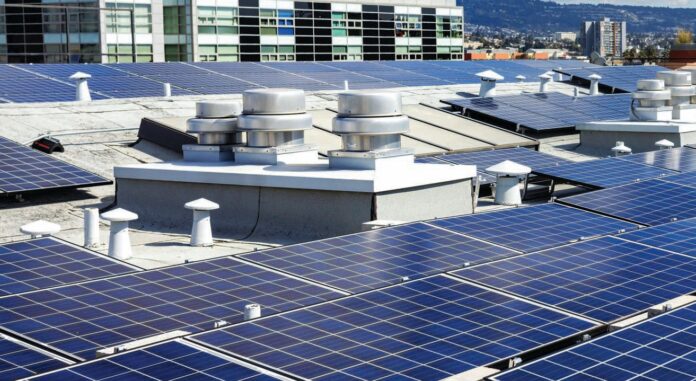
Thousands of corporations around the world benefit from solar power by maintaining their level of production and, at the same time, reducing their annual electricity costs as well as environmental impact. Along with the ability to produce and save energy, the commercial solar energy system will increase your property’s value and make it much more attractive to investors. Moreover, going solar will help enhance your company’s corporate social responsibility and positively impact the brand reputation regardless of the industry you operate in. Before embarking on your solar journey, however, you should be well aware of several factors that need to be considered beforehand to avoid extra costs.
Difference between residential and commercial solar power systems
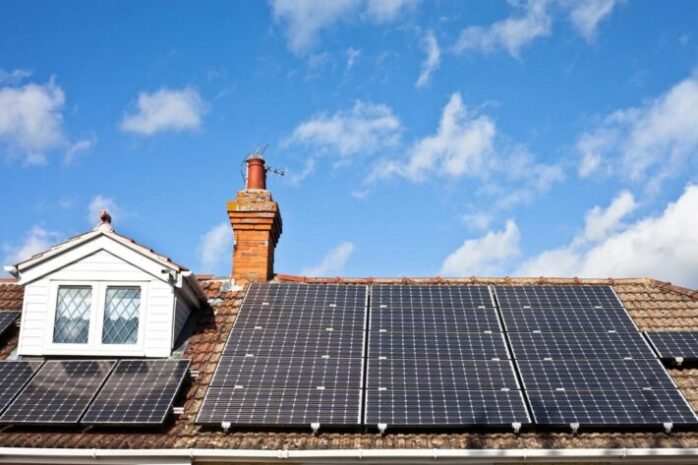
When deciding to have the system installed for your business, you need to know that it will be different from that of a home, especially in terms of the solar panel installation processes. Notably, the permitting process takes a much longer time for the commercial solar power system. The reason behind this is the scope of review concerning the local jurisdictions, according to which a more detailed approach is required for the commercial systems.
As a result, it can take 6-12 months before the project gets completed, and you may need to plan. Besides, the technical complexity of the system design is another differentiating factor. Namely, it is easier to identify technical problems and develop cost-effective solutions when the system is residential on a much smaller scale. On the other hand, the commercial system may require dealing with electrical equipment at a higher rating, making the technical considerations more complex. Hence, the processes are more time-consuming but with Bay Solar Group everything is simpler.
Also, the available space on the roof of a commercial building is usually more extensive than that of a typical house. Thus, the solar panel specifications are also varied. A residential solar panel system has about 72 cells, while a commercial one has 96 cells per panel. Accordingly, even though the roof’s flatness makes the commercial solar installation project much easier as a whole, it requires a considerable amount of time because of the number of panels. It is also correlated with the targeted energy production being significantly higher for businesses. Finally, financing is less accessible for commercial solar projects because it is a relatively new division of the solar power industry and needs time to get optimized.
Your readiness to go solar
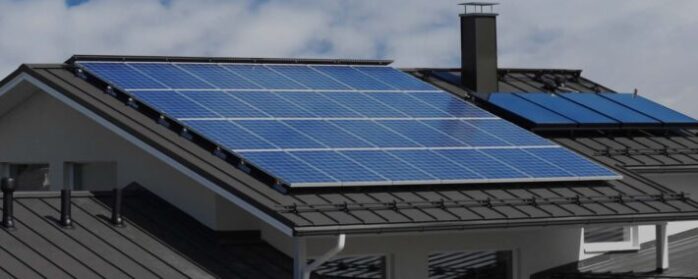
The roof condition is one of the primary things to consider before installing the solar system, as in case doing the installation without meeting the requirements will create additional expenses for the future. If you plan to install a solar panel system on the roof of your commercial building and know that it may need to be repaired, you should take care of it and make sure that the system is set only after the roof is in proper condition. When it shows some signs of age like lifting or cupping, for instance, you should definitely replace it and then consider installing a PV system.
If not, the whole work should be dismantled and redone, which is a waste of not only money but also time, being a massive loss for a corporation in terms of losing the opportunity to operate earlier and generate more profit. Aside from that, the roof and solar panels’ warranties should be compared with each other to make sure that there will be no increase in the maintenance costs. It is possible when your roof’s guaranteed life is much less than the life of the solar panels you plan to install, which is usually of about 20-25 years. Therefore, simply evaluate your roof condition before the solar panel installation and ensure that it will not affect energy production. Apart from that, minimal shading is needed for effective solar energy production. The more direct sunlight your company building gets, the more productive the installed solar panel system will be.
In case the building is surrounded by trees, you should figure out whether or not they have the potential to negatively impact the energy generation. By working with a knowledgeable consultant and discussing all the principles for a high return on solar investment, you will understand whether your business is ready to go green and, if not, how you may deal with the created situation. Most of the time, the installers come up with several suggestions to make you eligible for solar investment.
Defining project goals
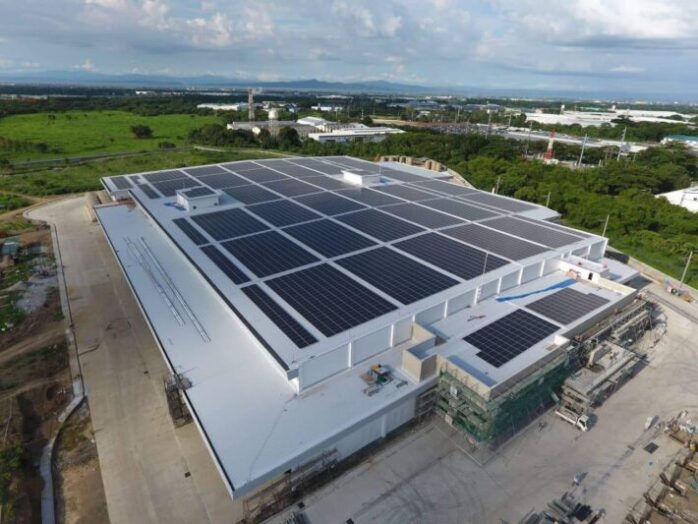
As soon as you distinguish between residential and commercial solar projects as well as are informed about the factors you need to consider, your project objectives should be defined.
Those goals are to determine the size of the needed system and, at the same time, enable the solar providers to adjust their bid responses. For example, suppose the goal is to achieve energy security when there is a grid outage. In that case, battery storage may be considered to utilize the extra power that is normally produced by the solar system. You better take into consideration also your possible future needs, as in that way system design will be much more effective, and you will avoid some additional expenses in the future. When you are clear about the objectives of your solar panel installation, it becomes easier to decide the evaluation criteria for the bids.
When coming to the actual bid evaluation, it should be noted that creating an evaluation committee and developing a scoring system is one of the most effective methods among commercial solar installation practices. The committees are usually made up of representatives from different departments of the company, including engineering, procurement, finance as well as sustainability offices. There can be some defined installation project characteristics, which will be a leading source for the selection criteria. Here again, your company’s priorities should be considered.
Suppose your number one priority is the cost-effectiveness of the installation, for instance. In that case, you may choose the option that meets the company’s financial savings targets and possibly exceeds the competitor providers’ bids. Another selection criteria may be the company’s experience and its team to install similar projects, as usually a qualified team with past experience is needed to ensure effective communication. Furthermore, the implementation schedule can be your decision making factor in case you need the provider to construct the project in such a way to meet your deadlines.
Selecting the right solar provider
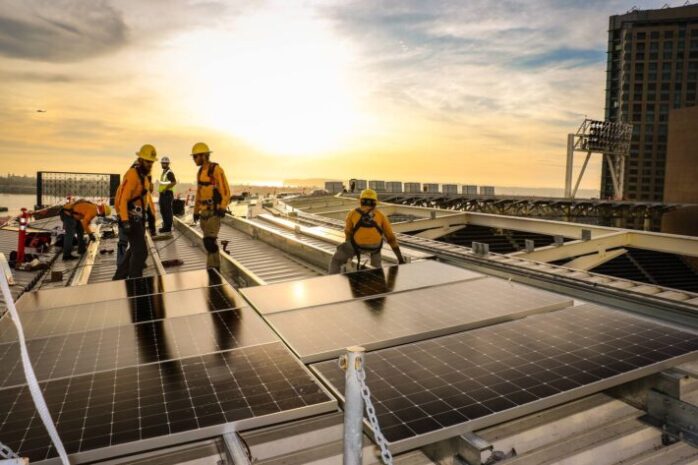
Your solar provider choice can decide whether or not the return on your investment is maximized. So, to make the most use of the solar energy benefits, you should consider multiple solar panel system installers and try to figure out the trade-offs between the available options. To realize that, you can start with the development of Request for Quote (RFQ). According to EcoWatch.com RFQ is used to inform the solar providers that your company is open to receiving bids for a solar panel installation project. Meanwhile, it communicates the already defined project specifications and priorities to the providers ready to submit proposals.
Identifying 4-5 qualified bidders and shortlisting the ones with higher potential will help you save much time on decision making as well as will increase the effectiveness of your choice. It is vital to provide the bidders with adequate response time since they need it for delivering quality offers. Afterward, the evaluation committee can analyze the RFQ responses and make a choice based on the predetermined selection criteria by making sure the chosen solar provider meets the needs of your company. In addition, they may need to check whether or not the rebates, governmental incentives and available plans are considered by the shortlisted solar providers, as it is another opportunity to cut costs.
Proper system maintenance
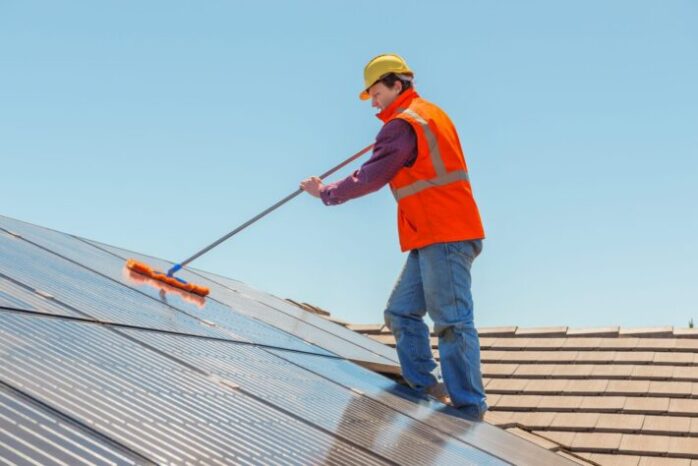
The length of your solar system’s lifespan will be strongly related to how you take care of it. Maximum efficiency and most effective power generation can be guaranteed only if you ensure the required maintenance of the system. Usually, the contract specifies the organization’s involvement level in the operation and maintenance of the installed system.
Here, it is crucial to choose such a solar installation team that is resourceful and experienced enough to monitor the system throughout its whole lifespan accurately. The operation and maintenance packages include mainly performance monitoring, warranty repair, annual inspections, and sometimes routine cleaning. So, undertake regular maintenance, and your solar panel system will operate safely and efficiently. By doing this, you will avoid a number of possible issues that may have occurred if you left the system unmonitored and hence, will increase your return on investment.
By investing in a solar energy system, you protect your business from the unforeseen increases in electricity costs and, at the same time, get the opportunity to better forecast as well as manage your expenses. However, just an installation is not enough to take advantage of all the benefits that you can get from your solar journey. You should also be informed of the factors that need to be checked out before going solar and the conditions to be followed for taking the most advantage of your investment.











